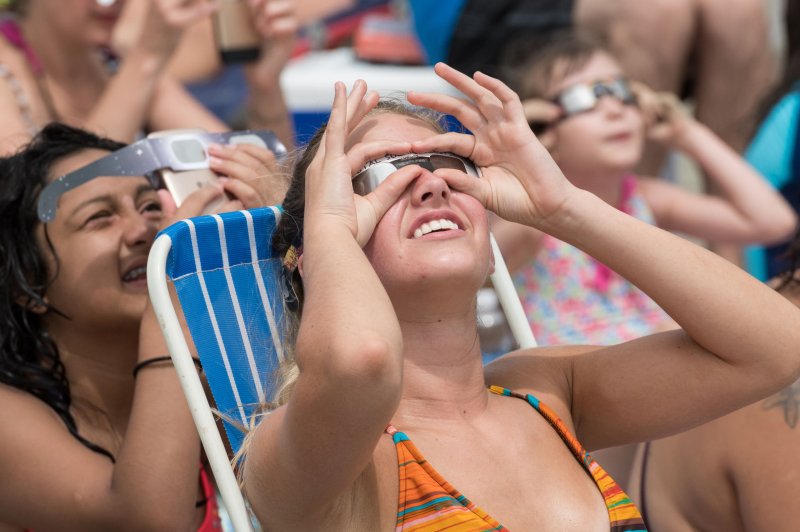1 of 2 | Beachgoers watch the total solar eclipse on the beach in Isle of Palms, S.C., in August 2017, taking precautions to prevent eye damage. File Photo by Richard Ellis/UPI |
License Photo
NEW YORK, April 2 (UPI) -- Nearly one-third of Americans don't know viewing a solar eclipse without the correct eye protection can cause permanent damage, according to a new survey released Tuesday.
The survey of 1,006 people, conducted by The Ohio State University Wexner Medical Center, asked Americans about their knowledge of health risks that could emerge from Monday's celestial phenomenon.
"The total solar eclipse is a highly anticipated event, and while there is a lot of excitement, historically there has also been misunderstanding around potential health risks," Dr. Nicole McAllister, an attending physician of emergency medicine and EMS at Ohio State, told UPI.
In conducting the survey, "We wanted to generate awareness in order to encourage people to take the proper precautions to protect themselves," McAllister said.
While viewing an eclipse, proper eye protection is paramount, doctors say.
They recommend wearing specialized eclipse glasses that comply with the ISO 12312-2 international standard. These glasses can be purchased online, at local stores, in science museums or through the Prevent Blindness advocacy organization.
The solar filter in these glasses neutralizes the sunlight, so it's not as intense on the eyes, Dr. Rajeev Ramchandran, an associate professor of ophthalmology at the University of Rochester Medical Center's Flaum Eye Institute in Rochester, N.Y., told UPI.
"It's really important that you put these glasses on before you look at the sun, or you don't look at the sun at all," Ramchandran said, adding that his clinic is giving them away to help promote vision safety.
"Survey respondents thought that wearing sunglasses and briefly looking at the sun were safe for the eyes. However, even a few seconds of looking at the sun without proper eye protection can lead to permanent blindness without any warning signs or symptoms, including pain," he said, cautioning that people also should avoid peeking at the sun through their fingers or window blinds.
When the moon partially blocks the sun, there is still a sliver of the sun left. "Those rays can have high energy, and they can damage the retina permanently," causing a condition called solar retinopathy," Dr. Avnish Deobhakta, an ophthalmologist and retina specialist at New York Eye and Ear Infirmary of Mount Sinai in New York City, said.
"If that occurs, it's very difficult for people to use that part of the retina to see," Deobhakta added, noting that a word in a particular sentence may appear invisible when someone is trying to read. "There would be a discontinuity in their visual field, almost as if the eclipse burned a crescent in the retina."
The vision loss may be temporary or permanent. During past eclipses, people came to the emergency room with blurry vision or other eye-related issues, McAllister said. In some cases, their eyes experienced "the equivalent of a sunburn."
For adults planning to view the eclipse with children, she recommends discussing proper eye safety and encouraging them to practice wearing their specialized glasses in advance, so they're prepared.
But it's still important for parents to watch children carefully during the eclipse to ensure that they keep the glasses on at all times, said Dr. Jill Beyer, an optometrist and a clinical assistant professor of ophthalmology at Stanford University School of Medicine in Stanford, Calif.
"More UV radiation can reach the retinas of children, but all ages need to avoid looking directly at the sun," Beyer said. "Even viewing the eclipse for a very short period of time can cause permanent eye damage. The damage can occur in less than a minute."
Few people are aware of the real danger. But more than 10% of Americans polled in the Ohio State survey mistakenly believe an eclipse can cause natural disasters, sleep problems and mental health issues.
Many superstitions around total solar eclipses stem from ancient history. Little had been understood about this natural phenomenon, leading to unusual beliefs and explanations for how and why they occur, McAllister said.
"Today, we have a clear scientific understanding of total solar eclipses. Yet, some of the misconceptions persist because eclipses don't happen frequently and superstitions have been passed down from generation to generation," she said.
During the solar eclipse in August 2017, then-President Donald Trump, first lady Melania Trump and their son, Barron, stepped out onto the White House balcony and looked up at the sun. Trump squinted and pointed toward the sky before donning protective peepers.
"Eclipse misconceptions are widely held and can be dangerous," possibly leading to severe damage of the retina, Dr. Raj Maturi, clinical spokesman for the American Academy of Ophthalmology, said.
"On a normal day, when we look at the sun, the brightness hurts our eyes and makes us look away," said Maturi, an ophthalmologist at Midwest Eye Institute in Indianapolis.
"When the sun is partially occluded by an eclipse, we're able to look at the sun for a much longer time and this is when the problem happens," he said. "It's something so interesting, so absolutely we look at it much longer."
About 32 million Americans live in areas along that path of totality, according to NASA.
"There's so much fascination with the upcoming total solar eclipse because it is such a rare, natural phenomenon," McAllister said. "For many people, this may be the first and only time they will get to experience an event like this in their lifetime."















